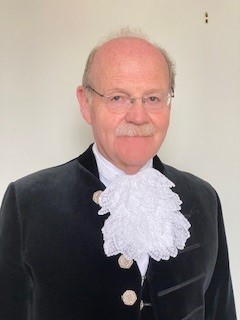The High Sheriff of Gloucestershire
About
The role of the High Sheriff traditionally involves attendance at royal visits in the County and support for His Majesty’s High Court Judges when on Circuit. These days, however, High Sheriffs play an increasingly active and supportive role within their Counties both in relation to the Police and emergency services and in lending encouragement to public sector agencies such as the probation and prison services and to voluntary sector organisations involved in crime reduction and social cohesion.
Mark Hurrell - Current High Sheriff
Now retired from full time work in the media, Mark joined the BBC in 1978 and, apart from a short time in commercial radio in the early 1980s, worked for the Corporation continuously in a wide variety of roles; these included presentation and production in both TV and radio before he turned his hand to management and leadership. He came to Gloucestershire in 1990 for a senior role at BBC Radio Gloucestershire . Following a spell at Points West TV in Bristol he was appointed as Editor of BBC Radio Stoke in 1998. He returned in 2002 to run Radio Gloucestershire where he was actively involved in many of the station’s major stories, including extensive coverage of the 2007 floods. In 2013 he worked in London for a year managing a BBC-wide initiative, ‘World War One at Home’ and fulfilled a similar role in 2016, this time with local radio /TV coverage of the centenary of the Battle of the Somme.
He and his family have lived in the city for over 34 years and he’s become involved in the local community in a variety of ways; he is a season ticket holder at Kingsholm and sings with several local choirs. A founder member of the Honourable Company of Gloucestershire ,where he chairs the Arts & Heritage committee ,Mark is an Honorary Fellow of the University of Gloucestershire and in 2017 was appointed a Deputy Lieutenant. He has been involved with a variety of local charities including The Cranfield Trust ,The Friends of the Cotswolds and now sits on the Cathedral’s Development Board.

Visit the Gloucestershire High Sheriff's website.
'Getting Court'

In addition to resources and initiatives run in the past with previous High Sheriffs, January 2012 saw the launch of the latest initiative of this partnership, 'Getting Court', co-ordinated by the previous High Sheriff, Mark Heywood. This resource is designed for use in secondary schools or colleges and is a series of lessons explaining the workings of the Crown Court system of England and Wales, alongside some innovative lessons to challenge pupils, e.g. to question if they would speak up for justice, no matter what the risk, as well as a host of other related learning opportunities.
The project fits into the existing PSHE & Citizenship part of the National Curriculum. This resource has been carefully tailored to respond to the curriculum in a way which will provide an introduction for both teachers and students at the heart of its purpose, which is to attend a working Court to see and hear the sometimes harsh realities, of the criminal justice system, being played out. Getting Court is a very easy to use, off the shelf resource, written by teachers who have been supported by professionals who work within our judicial system.
The resource covers the following:
-
What happens if you have to make a choice?
-
What happens if you break the law?
-
What happens if you have to speak up?
-
What happens if you are found guilty?
-
What happens if you visit a court?
And finally, some assessment for learning ideas and useful websites.
You can read the table of contents of the lesson pack here. One chapter gives guidance for teachers wishing to take students to Crown Court – this includes draft parental consent letters and risk assessments.
Launched across the county in January 2012, this resource was rolled-out to all Gloucestershire secondary schools and the visits have been running since October 2011. Out of all the replies received from children and young people who have visited the Crown Court in action, through this programme (1 visit is run per month), the following statistics show the impact on these children and young people.
41 children and young people changed from having a low level of awareness to a high level of awareness of the Crown Court System and how it works in England and Wales
46 children and young people reported that as a result of the Crown Court visit undertaken, their behaviour, or the behaviour of others, will change in the future.
Reasons for this reported change given by the children and young people have included:
-
It will influence them to behave well
-
More awareness of punishment
-
Aware of consequences now make me think more
-
Was the real world – need to be more like an adult – harsh sentencing for doing things wrong so need to be careful
-
More awareness of punishment
-
Would be punished fairly
-
The consequences of doing wrong scared them
-
Getting in to trouble would affect their future and lifestyle
-
Would be scared of going to prison
Any enquiries about Getting Court training please contact Di Harrill, one of the Lead Teachers on the team, at di.harrill@ghll.org.uk or one of the GHLL administrators ghll@Gloucestershire.gov.uk
Tagged under: crime, British Values, hate crime
Was the information on this page helpful? 


